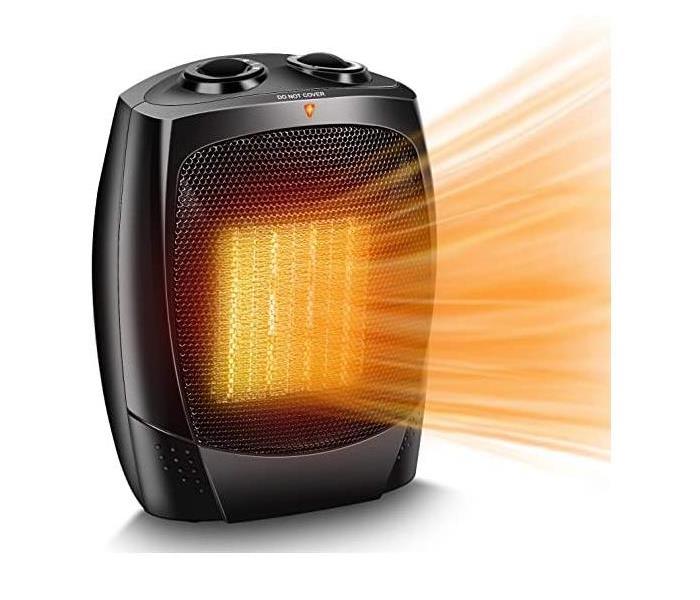How Not to Burn Your House Down with a Space Heater
2/15/2021 (Permalink)
“How Not to Burn Down Your House With a Space Heater”
A recent article in the New York Times cited a personal near-disaster with a space heater by the author. This is scary stuff! And it happens so much more than most of us realize: there are an estimated 25,000 fires in homes and apartments due to space heaters each year; this causes more than 300 deaths; over 6,000 trips to the emergency room are attributed to such fires. In spite of these numbers, if we follow the do’s and don’t’s of use, space heaters are a safe way to supplement heat in small or specific spaces.
In confined spaces, electric, radiant and convection heaters are better options than combustion heat systems. Keep in mind that all heat production still causes heat and therefore, carries risk. These heaters are much safer now than what were manufactured in the past. They have better insulation. They have smaller grates to discourage small fingers and objects from coming into contact with the heat source. Many models are thermostatically controlled, so they shut off when a programmed temperature is reached. Sensors may detect blocked air passages. Some models have tip-over switches that shut the unit down if it is not flat on the ground.
Home or personal use space heaters must be approved by an independent testing laboratory for safety. Most recognized are Intertek (ETL) and Underwriters (UL). If you do not see a validation on the product, do not take a risk on it.
At this time, there are few space heaters with smart-home capabilities. Please consult Wirecutter’s for their picks of those that are available. It is recommended that you do not use a standard timing device for your heater. Due to the electrical demand of these products and the heat generated, timer devices are not designed for this usage. If your heater does not have a timer or you are insistent on commanding through voice activation, a plug-in smart outlet may offer some assistance. Wirecutter’s suggests Wemo Mini.
Go ahead! Use that space heater!... But… Here are some Safety Tips:
- Don’t crowd the unit. The 3ft rule is strongly suggested: keep the unit at lease 3ft away from combustible materials such as bedding, draperies, papers, clothing, etc.
- Examine the condition of the electrical cord. If it is frayed or damaged in any way, do not use. Also, it is not recommended to use extension cords, power strips, timers or multi connector plugs. Use only a wall outlet. Added layers of connection can overload the circuit or create additional resistance that can cause heat buildup, possibly resulting in a fire or internal electrical damage. If you must use an extension cord, make certain that it is a minimum of 14-guage.
- Make certain that the “plug is snug!” The heater must be plugged into the wall outlet securely, unable to come loose or fall out. If the power cord or wall outlet becomes hot to the touch, unplug the unit and consult an electrician. There is a problem!
- The heater should be placed on the floor in a very stable position, in a spot where it is unlikely to get knocked over. Do not set on a table, chair or any surface that is or could become unstable.
- Do not use the heating unit in or near water, or if you are wet. Otherwise, you will be shocked as a result… Literally, shocked!!
- Do not “hide” cords under rugs, furniture or carpets. This can prevent the heat from escaping that is created by the resistance in the electrical cord. Be careful not to pinch, bend or crimp the cord. This can impede the electrical current and contribute to the buildup of heat and energy.
- Make certain that your smoke and carbon monoxide detectors are functioning properly.
- Use a space heater designed for the space you have determined. Too large of a unit will overheat the space and use more electrical resources than necessary.
- Train and teach everyone in the household the proper use, operation and care of the unit. Small children should be taught to stay away for safety purposes. Turn the unit off when asleep, in a different room or when unable to keep an eye on it.
- For combustion heaters, use the right kind of fuel. Substitutions can cause a fire and the malfunctioning of the unit. Never use fuel-burning units in a closed environment, such as your home. Proper ventilation is crucial when used in an enclosure.
Stay warm this winter. Space heaters afford us intimate heat sources in an environment that may not meet our individual needs for comfort. Most of all, stay safe!






 24/7 Emergency Service
24/7 Emergency Service
